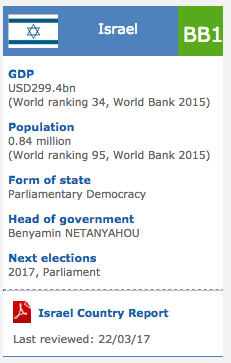Country Rating BB1
|
Strengths
-
Entrenched democratic system, including peaceful transfers of power and effective rule of law
-
Strong military
-
U.S. political and economic support
-
Classification in MSCI indices as developed market economy with high incomes and robust long-term economic growth
-
Low unemployment rate and increasing wages
-
Strong scientific environment with a flourishing High Tech industry and the world’s highest ratio of R&D expenditure to GDP
|
Weaknesses
-
Regional instability and conflicts contributing to security concerns, growth constraints and limits to the effectiveness of economic policy
-
Frequent turmoil within coalition governments
-
Economic dependence on the U.S., the main export destination. Close links with that country include grants and aid that can be revoked
-
High short-term external debt
|
Economic Overview
Growth shows resistance despite geopolitical instability…
Real GDP growth gained strong momentum in 2016, reaching +4% (up from +2.5% in 2015). Robust domestic demand was the main driver of growth, thanks to a strong decrease in unemploy-ment (from 9.4% in 2009 to 5.2% in 2016) and the deflationary context (average CPI down by -0.6% in 2015 and -0.5% in 2016). Private consumption rose by +6.1% in 2016 (+4.1% in 2015) while fixed investment surged by +11% (flat in 2015). As the latter will normalize, Euler Hermes expects annual growth to slow down but remain resilient at above +3% in 2017 and 2018.
Political risk will continue to nourish uncertainty, weighing on growth potential in the medium term. On 6 February 2017, the Knesset passed a law authorizing the government to “regulate the status” of private Palestinian land in the West Bank, likely to trigger international sanctions and potentially violent Palestinian protests. And the stance of the U.S. on the Israeli-Palestinian conflict needs monitoring as the Trump administration may break with the U.S. tradition on that matter. Regional instability remains a concern due to Israel’s proximity to countries at war (Syria and Iraq) or involved in geopolitical tensions (Iran and Saudi Arabia).
…supported by sound macroeconomic fundamentals
Following persistent deflation from September 2014 to end-2016, consumer prices edged up by +0.1% y/y in January 2017. Euler Hermes expects inflation to pick up gradually in 2017, approaching the target range (1% to 3%) of the Bank of Israel (BoI; the central bank) by year-end. In order to dampen the appreciation of the ILS (+3.5% in 2016), the BoI has pursued accommodative mone-tary policies and kept its key policy interest rate at 0.1% since March 2015. As a result, the residential building sector has performed well (+7% y/y), capitalizing on low interest rates, high prices and elevated demand.
Good progress was achieved in reducing public debt to currently about 64% of GDP (from 75% in 2010). The budgetary expansion planned for 2017 (which will raise the fiscal deficit to -3.5% of GDP from -3.2%) is unlikely to have major growth effects as there is no focus on investment in education, health and infrastructure.
The current account balance will remain in surplus in 2017-2018 though it is forecast to narrow further after it declined to about 3.8% of GDP in 2016 as exports faced headwinds from modest U.S. and EU growth and rebalancing in China, along with a stagnating tourism sector.
















